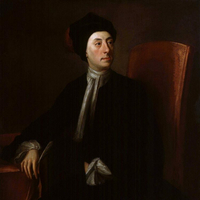An Ode: on Exodus Iii. 14
On Exodus III. 14. ‘I am that I am.’
Man! foolish man!
Scarce know’st thou how thyself began,
Scarce hadst thou thought enough to prove thou art,
Yet, steel’d with studied boldness, thou darest try
To send thy doubting Reason’s dazzled eye
Through the mysterious gulf of vast immensity;
Much thou canst there discern, much thence impart.
Vain wretch! suppress thy knowing pride,
Mortify thy learned lust:
Vain are thy thoughts while thou thyself art dust.
Let wit her sails, her oars let wisdom lend,
The helm let politic experience guide;
Yet cease to hope thy short-lived bark shall ride
Down spreading Fate’s unnavigable tide.
What though still it farther tend?
Still ’tis farther from its end,
And, in the bosom of that boundless sea,
Still finds its error lengthen with its way.
With daring pride and insolent delight,
Your doubts resolved you boast, your labours crown’d,
And, EYPHKA your God, forsooth, is found
Incomprehensible and infinite.
But is he therefore found? vain searcher! no:
Let your imperfect definition show
That nothing you, the weak definer, know.
Say, why should the collected main
Itself within itself contain!
Why to its caverns should it sometimes creep,
And with delighted silence sleep
On the loved bosom of its parent deep.
Why should its numerous waters stay
In comely discipline and fair array,
Till winds and tides exert their high commands!
Then, prompt and ready to obey,
Why do the rising surges spread
Their opening ranks o’er earth’s submissive head,
Marching through different paths to different lands?
Why does the constant sun
With measured steps his radiant journeys run?
Why does he order the diurnal hours
To leave earth’s other part, and rise in ours?
Why does he wake the correspondent moon,
And fill her willing lamp with liquid light,
Commanding her with delegated powers
To beautify the world, and bless the night?
Why does each animated star
Love the just limits of its proper sphere,
Why does each consenting sign
With prudent harmony combine
In turns to move, and subsequent appear,
To gird the globe, and regulate the year?
Man does with dangerous curiosity
These unfathom’d wonders try:
With fancied rules and arbitrary laws
Matter and motion he restrains:
And studied lines and fictious circles draws:
Then with imagined sovereignty
Lord of his new hypothesis he reigns.
He reigns; how long? till some usurper rise!
And he, too, mighty thoughtful, mighty wise,
Studies new lines, and other circles feigns.
From this last toil again what knowledge flows?
Just as much, perhaps, as shows
That all his predecessor’s rules
Were empty cant, all jargon of the schools:
That he on t’other’s ruin rears his throne,
And shows his friend’s mistake, and thence confirms his own.
On earth, in air, amidst the seas and skies,
Mountainous heaps of wonders rise,
Whose towering strength will ne’er submit
To Reason’s batteries or the mines of Wit:
Yet still inquiring, still mistaking man,
Each hour repulsed, each hour dares onward press,
And, levelling at God his wandering guess,
(That feeble engine of his reasoning war,
Which guides his doubts and combats his despair)
Laws to his Maker the learn’d wretch can give,
Can bound that nature and prescribe that will
Whose pregnant Word did either ocean fill,
Can tell us whence all beings are, and how they move and live.
Through either ocean, foolish man!
That pregnant Word sent forth again
Might to a world extend each atom there,
For every drop call forth a sea, a heaven for every star.
Let cunning earth her fruitful wonders hide,
And only lift thy staggering reason up
To trembling Calvary’s astonish’d top,
Then mock thy knowledge and confound thy pride.
Explaining how Perfection suffer’d pain,
Almighty languish’d, and Eternal died;
How by her patient victor Death was slain,
And earth profaned, yet bless’d with Deicide.
Then down with all thy boasted volumes, down;
Only reserve the sacred one:
Low, reverently low,
Make thy stubborn knowledge bow;
Weep out thy reason’s and thy body’s eyes;
Deject thyself that thou may’st rise:
To look to heaven, to blind to all below.
Then Faith for Reason’s glimmering light shall give
Her immortal perspective,
And Grace’s presence Nature’s loss retrieve;
Then thy enliven’d soul shall see
That all the volumes of philosophy,
With all their comments, never could invent
So politic an instrument,
To reach the heaven of heavens, the high abode
Where Moses places his mysterious God,
As was the ladder which old Jacob rear’d,
When light divine had human darkness clear’d,
And his enlarged ideas found the road
Which faith had dictated and angels trod.

